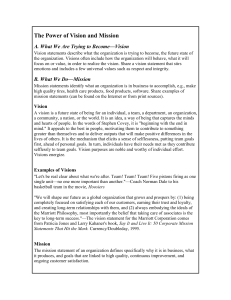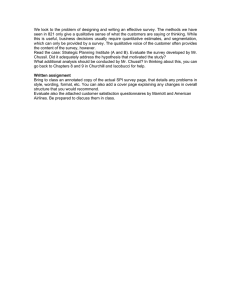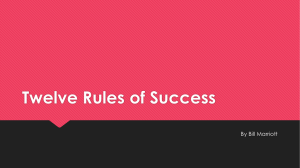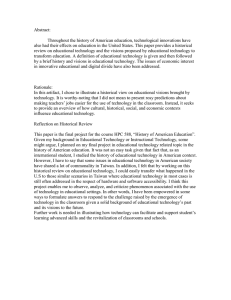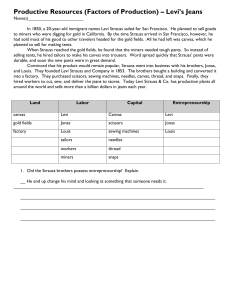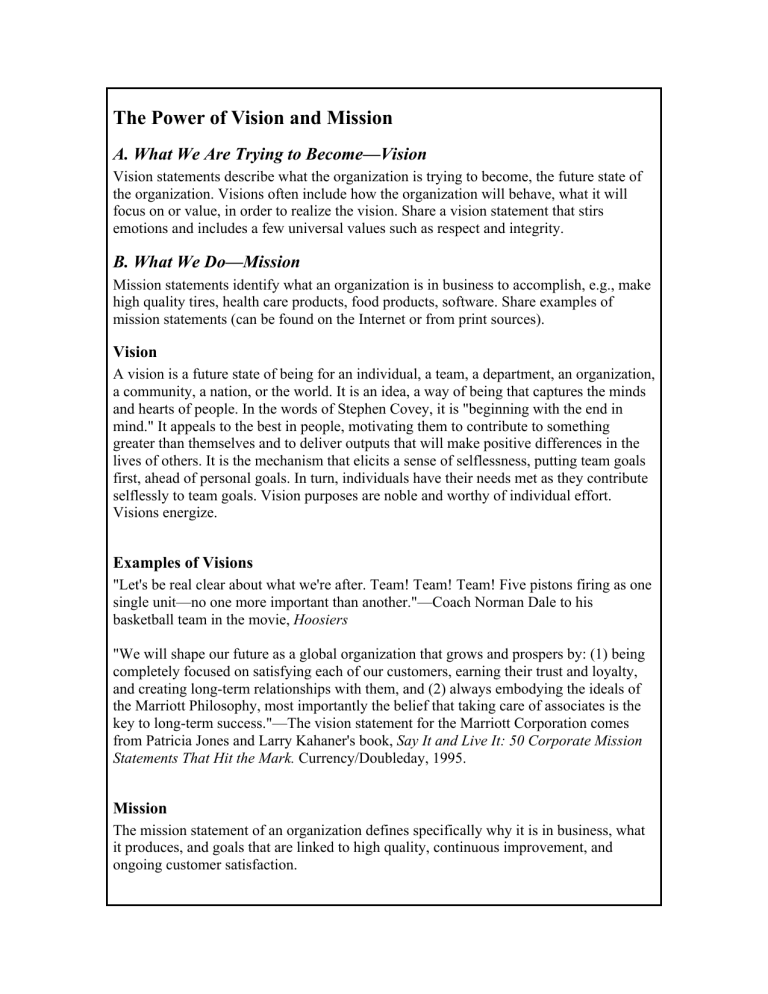
The Power of Vision and Mission A. What We Are Trying to Become—Vision Vision statements describe what the organization is trying to become, the future state of the organization. Visions often include how the organization will behave, what it will focus on or value, in order to realize the vision. Share a vision statement that stirs emotions and includes a few universal values such as respect and integrity. B. What We Do—Mission Mission statements identify what an organization is in business to accomplish, e.g., make high quality tires, health care products, food products, software. Share examples of mission statements (can be found on the Internet or from print sources). Vision A vision is a future state of being for an individual, a team, a department, an organization, a community, a nation, or the world. It is an idea, a way of being that captures the minds and hearts of people. In the words of Stephen Covey, it is "beginning with the end in mind." It appeals to the best in people, motivating them to contribute to something greater than themselves and to deliver outputs that will make positive differences in the lives of others. It is the mechanism that elicits a sense of selflessness, putting team goals first, ahead of personal goals. In turn, individuals have their needs met as they contribute selflessly to team goals. Vision purposes are noble and worthy of individual effort. Visions energize. Examples of Visions "Let's be real clear about what we're after. Team! Team! Team! Five pistons firing as one single unit—no one more important than another."—Coach Norman Dale to his basketball team in the movie, Hoosiers "We will shape our future as a global organization that grows and prospers by: (1) being completely focused on satisfying each of our customers, earning their trust and loyalty, and creating long-term relationships with them, and (2) always embodying the ideals of the Marriott Philosophy, most importantly the belief that taking care of associates is the key to long-term success."—The vision statement for the Marriott Corporation comes from Patricia Jones and Larry Kahaner's book, Say It and Live It: 50 Corporate Mission Statements That Hit the Mark. Currency/Doubleday, 1995. Mission The mission statement of an organization defines specifically why it is in business, what it produces, and goals that are linked to high quality, continuous improvement, and ongoing customer satisfaction. Mission Statement Examples Marriott: "Grow a worldwide lodging business using Total Quality Management principles to continuously improve preference and profitability. Our commitment is that every guest leaves satisfied." Intel: "Do a great job for our customers, employees, and stockholders by being the preeminent building block supplier to the computing industry." Gerber: "The people and resources of the Gerber Products Company are dedicated to assuring that the company is the world leader in, and advocate for, infant nutrition, care, and development." Kellogg: "Kellogg is a global company committed to building long-term growth in volume and profit and to enhancing its worldwide leadership position by providing nutritious food products of superior value." Levi Strauss & Company: "The mission of Levi Strauss & Company is to sustain responsible commercial success as a global marketing company of branded casual apparel. We must balance goals of superior profitability and return on investment, leadership market positions, and superior products and service. We will conduct our business ethically and demonstrate leadership in satisfying our responsibilities to our communities and to society. Our work environment will be safe and productive and characterized by fair treatment, teamwork, open communications, personal accountability, and opportunities for growth and development." Southwest Airlines: "The mission of Southwest Airlines is dedication to the highest quality of Customer Service delivered with a sense of warmth, friendliness, individual pride, and Company Spirit." Activities Activity 1. The Organization I Would Most Like to Work For 1. If you had to choose a career with one of the six listed companies, based on its mission statement, which one would you select? 2. List whatever factors influenced your decision. You may want to research the company to find out information such as its location(s) and the types of jobs it offers. 3. What skills, interests, and talents do you have that would make you an asset to the organization? 4. In what ways would the organization enhance your skills, interests, and talents? Activity 2: Using the Goals and Mission Statement in Decision Making Directions: In teams, review, the mission statements of the six companies, and answer the questions below. 1. What kinds of issues might managers in the company face where the mission statement could be used to justify an initiative, expenditure of funds, or other resources? 2. What criteria would you use in the selection of employees who would be interacting with customers on the phone? 3. List as many attributes and skills that you think an entry-level employee should have. Activity 3: Mission and Vision for My Own Business Directions: In small groups, discuss a type of business you would like to own and manage. Your business can make a product or provide a service. Decide on a company name. Briefly describe your business. Develop a mission statement that would reflect your business. Develop a vision for your business.
